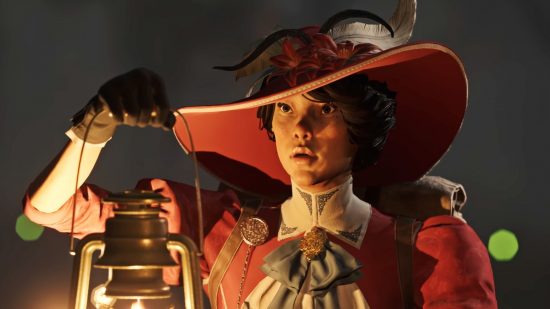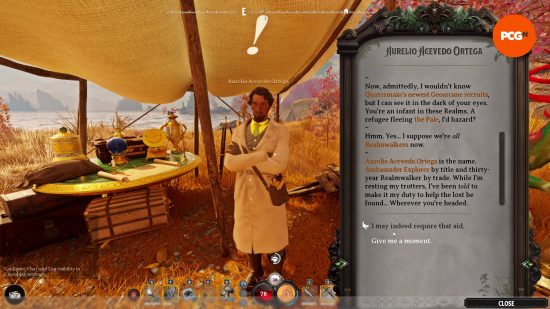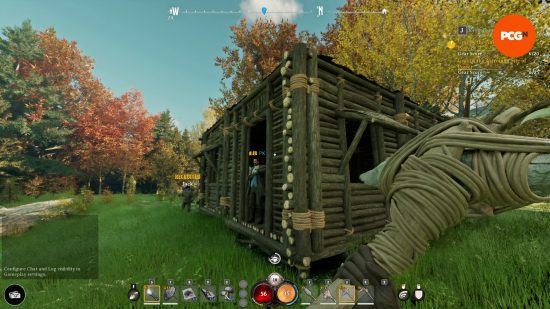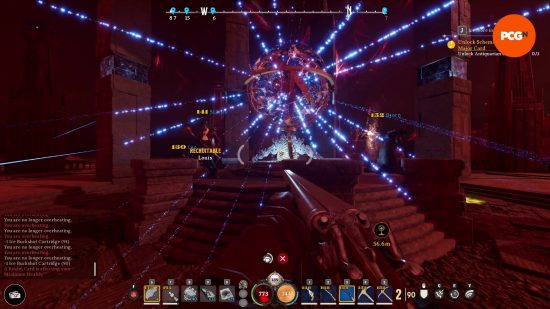So far, 2024 has been the year of the early access survival game, and it doesn’t appear to be slowing down any time soon. However, if the likes of Palworld and Enshrouded have left you cold, then Nightingale is probably enough to turn your head. Inflexion Games’ stylish presentation of open-world survival has left quite the impression, backed by a strong BioWare pedigree that includes art director Neil Thompson and production lead Leah Summers. PCGamesN sat down with them both ahead of Nightingale’s early access release to discuss what comes next.
Nightingale’s imminent launch is a success in itself after the survival game’s two-year delay, though in many ways it’s also when the real work begins. “It’s a whole new paradigm for us,” Thompson says, alluding to BioWare’s history of shipping a boxed product followed by DLC. The current forecast for the early access period on Steam is nine months to a year, with the caveat that it will remain in this state “until it is ready.” When I ask Thompson and Summers what the team’s highest priority is during this period, I expect a tease of new biomes and realm cards – and while that wealth of new content is certainly in the pipeline, Thompson emphasizes community above all else: “We want to hear what people have got to say about Nightingale.”

In another major departure from BioWare’s approach, Inflexion has maintained a close relationship with Nightingale’s budding community throughout its development. Constructive feedback from alpha playtests has become the cornerstone of its progression, though it only takes a cursory glance at Nightingale’s social platforms to see how hard that community hammer can fall. Striking the balance between the aesthetic and gameplay functionality was one such pain point. “We were failing to take into account what is expected in a contemporary UI from a modern audience,” Thompson admits. “We spent a good chunk of time, we went back to basics, and we recreated the UI virtually from scratch.”
This willingness to change tack stands Inflexion in good stead, but it also points to a potentially ill-fated reflex to conform to style over substance. Nightingale is billed as a gaslamp fantasy, a niche sub-genre that’s typically overlooked in favor of its more popular, clockwork-driven cousin. “Steampunk has some negative connotations in the way it’s perceived these days,” Thompson explains. “When it’s done well, it can be really cool. When it’s done poorly, it becomes risible.”
While Thompson stresses the genre’s marriage of magic and technology, there’s also an alt-historical angle that’s prevalent in Nightingale. “Once you start playing with alternate history, then you start thinking: ‘Which historical figures can we include in this and how can they fit into this world?’” Thompson says. “In real life, Ada Lovelace died very young. In our universe, she thrives and becomes head of one of the factions involved in building the machinery that interfaces with the portals.”
This new lease of life also extends to fictional characters such as Dr. Allan Quatermain, a classic literary explorer who serves as a perfect prototype for a Nightingale Realmwalker. Even Puck, the crafting game’s Fae mascot and omnipresent guide, is the very same Puck as depicted in Shakespeare’s A Midsummer Night’s Dream. Thompson points to Susanna Clarke’s Jonathan Strange & Mr Norrell as a “hugely formative” inspiration, and Inflexion has even gone so far as to cast British actor Marc Warren as Puck following his turn in the TV show adaptation.
While I’m immediately hooked by these intertextual narrative threads, Thompson is quick to assure me that Nightingale is not a narrative-led game. Instead, its rich lore and characters are a “canvas” for players to tell their own stories through its procedurally generated worlds. “The stories that players can create as a result of role-playing are far more powerful and compelling than the stories we could write,” Thompson says.
This feeds back to Inflexion’s design philosophy of Nightingale as a ‘place’ for its community to inhabit, a sentiment that’s both congruous with social hubs like World of Warcraft’s Stormwind and also an echo of Nightingale’s early beginning as an MMO. Home realms serve as the foundation of its social framework, but the ultimate destination is the city of Nightingale itself. Thompson describes it to me as a thriving hub of realm networks and factional quests: the point at which Inflexion’s vision for Nightingale comes to fruition.
With such an overwhelming player-first approach, I feel obliged to ask just how far Inflexion’s commitment to its community leads. As well as consistently serving its budding player base, Nightingale faces another challenge. In a landscape of ongoing live service games, how do you get people to drop what they’re playing and switch to yours? Thompson points to Nightingale’s $29.99 price point as an attractive value proposition for an open-world game of its size and complexity.
“We do not intend this to be a money gouge situation,” Thompson stresses. “We’re not going to do pay-to-win microtransactions. Our intention is to run it for as long as we possibly can, for as long as players are enjoying it.” This pledge to players is reflected in Inflexion’s commitment to server hosting, rather than palming off the cost to its playerbase. “That’s really how we see games as a service,” Summers adds. “It’s just being able to keep that place available for people.”



